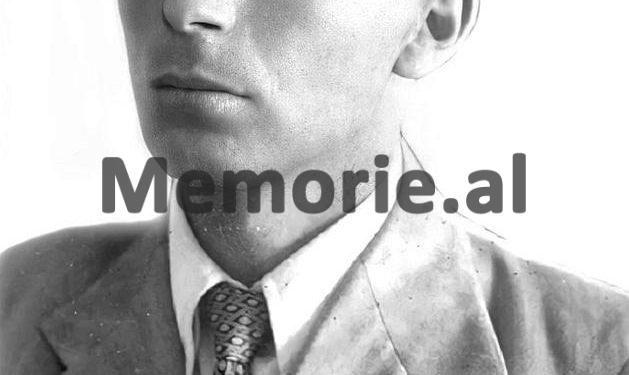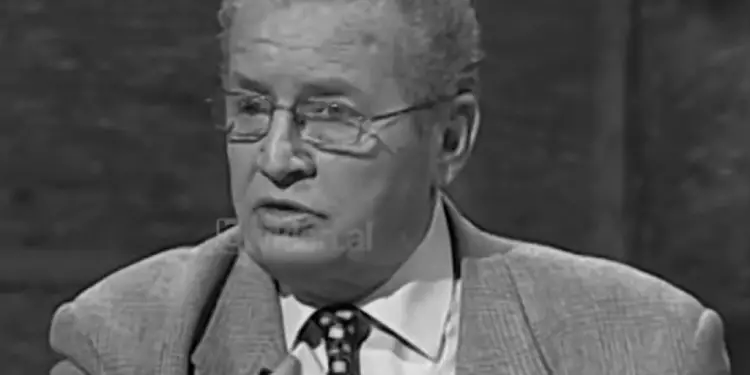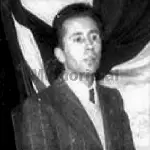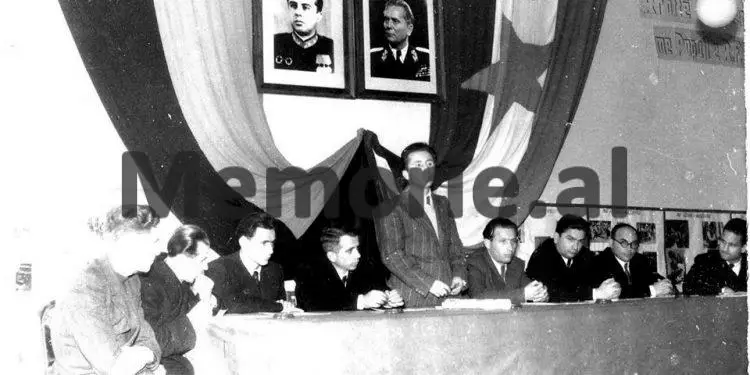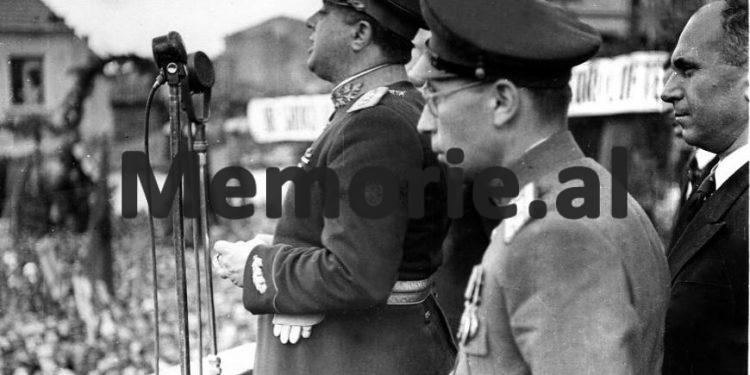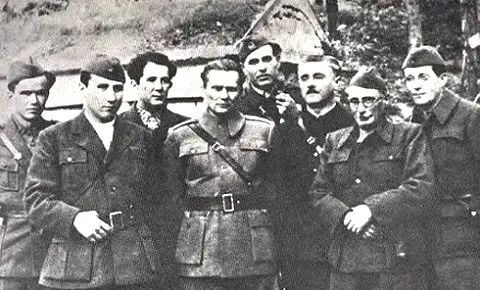By Prof.As.Dr. Gjergj P. TITANI
Memorie.al / The unknown story of Enver Hoxha’s closest associate, Nesti Kerenxhi, known as one of the former main leaders of LANÇ in Korça and later, as a former member of the Political Bureau of the Central Committee of the Albanian Communist Party and Minister of Internal Affairs, after the arrest of Koci Xoxe in November 1948. This interview was taken in 2003, a few weeks before his death and today is presented to the reader for the first time exclusively. Nesti Kerenxhi was one of the personalities of political life in Albania, who significantly influenced the organization of the war and the final victory and after 1944; he was declared a member of the Political Bureau by a majority vote. Meanwhile, after the liberation he also served as the head of the Albanian State Security, thus being the second man in the Ministry of Interior, after Koçi Xoxe.
But, as has happened with many personalities of Albania, in terms of disappointments, the same thing happened with Nesti Kerenxhi. After the shooting of Koçi Xoxe, Nesti was initially sentenced to dismissal from work, internment in Selenica and then imprisonment in political prisons. All this wave of terror began after the First Congress of the AKP, where the storm of eliminations, arrests, imprisonments and shootings also began. But, during this Congress, Nesti Kerenxhi was sentenced together with his wife, Naxhije Dumen, who was then the only female member of the government in the cabinet led by General-Colonel Enver Hoxha, holding the post of Minister of Culture.
This was due to the culture and education that radiated, but also to the fact that until then Enver Hoxha had both (Nesti and Naxhije) in good faith. Later, the sentence came after an accusation, as a “supporter of Koçi Xoxe”, which was never proven. However, Nesti Kerenxhi’s life went through many difficulties, until in 2003, he closed his eyes forever. And, a few days before his death, I managed to secure this interview, which I decided to publish now.
Mr. Kerenxhi, during the War, the representatives of the Red Army, who were there to bring the mission to Yugoslavia in those times, so difficult and what were your duties, you and Alqi Kondi, were the only high-ranking Albanian military cadres, who were sent in February-March 1944, to Marshal Tito and his Staff, to present the Soviet military request to Albania. On this occasion you also met with Marshal J.B. Tito. Can you tell us how you were able to go to?
You are right to ask this question, because in fact, if there was talk of something very positive at that time, years later, it was not only forgotten, but there was a lot of speculation about this very far-sighted act of the Albanian leadership of LANÇ, for the sake of the evil policies of the time. The connection of LANÇ with the wing of the great anti-Hitler allies, showed from the beginning the political maturity and true patriotism of the freedom fighters. Neither the “Balli Kombëtar” nor Legaliteti did this until the end.
The times when we left for Yugoslavia were truly very difficult. Here is the truth of this very important mission: The General Headquarters of the National Liberation Army had emerged from wandering through the forests of Martanesh and Çermenika and was located in the village of Panarit, in the western highlands of Korça. The road from distant Panarit to Peza and from here to Tirana, Shkodra and Montenegro, and then from Bari in Italy to the largest island on the Adriatic coast, in northern Dalmatia, called Vis, was very long and very dangerous.
When and how did you leave Panarit for Yugoslavia?
Initially, after taking office in Panarit, we drafted the travel plan, the places where I would stop, maintaining the secrecy of the mission and other details, I consulted with the main responsible people of LANÇ: Enver, Koçi, Spiro Moisiu and Miladin and Dushan. After receiving all the relevant confidential and official documents and letters, which in diplomatic language are called letters of credence and, after a final detailed consultation with Mustafa Gjinishi, who was a true master and knew very well the route I would take and the people I would have to meet on this very responsible and dangerous journey, I set off on foot from Panarit, where the headquarters of the General Staff of LANÇ was located at that time.
After traveling the long way through dangerous areas from Panariti to Central Albania, precisely in the village of Rasë, at the foot of the Shkumbin River, somewhere near Cërrik, according to the precise recommendations of Mustafa Gjinishi, I crossed the Shkumbin River without any problems on the raft, with a raft that was steered by one of our War men, but at the same time, it was equally well guarded by the German ballistic missiles on the other side. In Garunjë e Vogël I found another trusted person, also of Mustafa Gjinishi, who accompanied me to Peza. From there, accompanied by another courier, I set off at night for Tirana. I had to come to the safe base of LANÇ, which was the house of our faithful comrade Zeqi Agolli, a very important War base.
Alqi Kondi had been waiting for me for days at Zeqi Agolli’s house. He had been assigned to come with me, as a member of the delegation to Yugoslavia. I learned that in those days Alqi had been assigned the task of youth leader in the Second Assault Brigade, which was commanded by Beqir Balluku and Commissioner Vasil Konomi, two very experienced leaders. After I had rested well, because I was exhausted from the long journey, and after talking face to face with Alqi about the difficult task that had been assigned to us, we were ready for an even longer journey, completely unknown and dangerous. The instruction from the main leaders was to maintain the absolute secrecy of the mission.
So, with a Tirana gendarmerie ambulance, which Xhaferr Spahiu had prepared for us, which was driven by a non-commissioned officer, the driver of the commander of the Tirana Gendarmerie, we both set off with Alqi, without encountering any problems on the way and arrived in Shkodra. From there we went to Reç, where our excellent friend Çun Jonuzi, a close friend of Vasil Shanto, Tuk Jakova, Sadik Bekteshi and Zija Dibra, was waiting for us. Çun Jonuzi accompanied us to the edge of Lake Shkodra, to a well-prepared and well-camouflaged place, where our LANÇ comrades often made clandestine crossings to that side of the border, that is, to Yugoslavia. There we boarded a wooden boat of the “gjemi” type and, after great care, crossed into Montenegro.
Across the Albanian border, when you went to Montenegro, who did you meet?
It must be said from the beginning that this mission of such importance was perfectly organized. Couriers were waiting for us at the border, who would accompany us to the designated place. From there, the Montenegrin couriers accompanied us to the famous monastery of Moraca, which was the most important base of the Anti-Fascist War in that region, where we met with the commander of the 9th Partisan Assault Brigade of Montenegro, Commander Vojo Todorovic, whom I had known since the First National Conference of the Albanian Communist Party, in Labinot. Here, in this monastery, was also the headquarters of the Second Yugoslav Partisan Corps, with the brave and experienced commander, General Peko Dapcevic, who was an excellent internationalist fighter of the Spanish War and a close friend of Arso Jovanovic, who later had a tragic end with many consequences for all his comrades.
At the Headquarters of the Second Army Corps, among others, I met Blazho Jovanovic, whom I had also known since the First National Conference of the CPSU, in March 1943, in Labinot, Elbasan. To him personally, according to the instructions I had received from the Leadership of the Albanian LANÇ, I handed over the letters in Serbo-Croatian that Miladin Popovic had given me for Tito. So, I want to emphasize: do you see how carefully this important mission was prepared? It was here, at the headquarters of this Yugoslav Corps, that Alqi and I, two young Albanian cadres, met for the first time a Soviet major, who I think was called Nikolayev, who represented the group of the Soviet Major General, Nikolay Vasiljevic Korneyev, who was the envoy of the Supreme Soviet High Command to the General Staff of the Yugoslav Army.
Major Nikolaev, whom we met at the Moraca monastery, was the envoy of General N.V. Korneyev and the Red Army in Montenegro. He immediately informed his superior officer, General Korneyev, who was currently at the General Staff of Tito’s Yugoslav Army, which had been installed on the island a short time earlier, precisely on June 3-4, 1944, after a successful departure by Soviet aircraft to Bari, Italy, and then by Allied ships, was transported to the island of Vis. The General Staff of the Yugoslav Army, after successfully breaking a very dangerous action by German paratroopers, who had almost captured Tito, along with the entire War Headquarters.
Soviet Major General Korneyev immediately notified the Supreme High Command of the Red Army in Moscow. So, I told Major Nikolayev, the first Soviet officer we met, why we had come from Albania and presented him with the official request of the General Staff of the Albanian Partisan Army to send a Soviet military mission to Albania as soon as possible. We had decided to make our request for the military mission known to the first Soviet military major I would meet, because it was wartime anyway and anything could happen to our lives. Major Nikolayev, a man with professional and combat experience, with absolute correctness, assured me that he would inform his boss as soon as possible about the request I had submitted to him. “Because, such a request,” Major Nikolayev told me, “as far as I know, has been submitted by your Command for the first time and this is of particular importance.”
I would like to emphasize that the Soviet military mission headed by Major General Nikolaj Vasilijevic Kornejev and a large group of colonels had also arrived near Tito on February 23, 1944, that is, on the day of the Red Army holiday, exactly at that time when Alqi Kondi and I set off for Yugoslavia. Was this mission a combination of the warring General Staffs? It is hard to say, but it is also hard to deny. It was in Montenegro that the first phase of our combat duty ended, but certainly not the entire mission.
How did events develop further? Did you meet Marshal Josif Broz Tito at the headquarters of the General Staff of the Yugoslav Army, which was located on the island of Vis?
After that, with a military transport plane, piloted by a Soviet crew, we went, accompanied by the Yugoslav authorities, to Bari, Italy, which had been liberated by the Anglo-American allied armed forces in those days. After staying in Bari for a short time, we set off by steamer to the island of Vis. We crossed the entire Adriatic Sea, from south to north, and arrived on the island of Vis, where Tito’s Military Headquarters was located. J.B. Tito had not long before been awarded the high military rank of “Marshal” by the Military-Political Presidency of the Anti-Fascist Liberation War of Yugoslavia. From what we had previously been informed, the leadership of the Yugoslav People’s Army consisted of: J.B. Tito, Eduard Kardelj, Aleksandar Ranković, Vladimir Bakarić, Ivan Milutinović, Svetozar Vukmanović Tempo and Milovan Đilasi.
At the time we went with Alqin, this leadership was all located on the island of Vis and was leading the liberation war of the peoples of Yugoslavia. I would like to emphasize that S.V. Tempo, I had met in Kucakë and Vithkuq, when he came to Albania with special tasks and for talks with the CPSU and about which I have expressed myself above. The headquarters of the Yugoslav General Staff was specially located in some rocky mountain caves, tunnel type, on the slope of a granite mountain, but J.B. Tito worked in surface environments. The Soviet military mission was also located on the island, headed by Major General N.V. Korneyev, as well as representatives of the British armed forces and representatives of other countries such as Greece, Czechoslovakia, the Bulgarian anti-fascist front, etc. On this large island, considerable units of the Yugoslav and British Navy and Aviation were stationed, as well as a Yugoslav Army Division, the 26th, I think, and a tank brigade.
It was here, at J.B. Tito’s General Staff, that Alqi Kondi and I were the first Albanian partisans, high-ranking war cadres, to officially meet Marshal Tito and the Soviet Major General Korneyev, who limped a little because he had lost the sole of one foot in the fighting of the Battle of Stalingrad. After a short time, we held regular official talks with them. The talks were very constructive and calm in French. I remember the translator, a very serious blonde woman, spoke this language very beautifully and with perfect elegance. Even with Major General Nikolaj Vasiljevic Korneyev, the same woman translated for us. After the talks with our delegation, which took place in a very warm and fraternal spirit, despite the age difference, Marshal Tito hosted a pleasant lunch in our honor, where Alqin and I, who were younger than Tito’s eldest son, noticed that he was very polite in conversation and had a pleasant sense of humor. His cheerful smile and especially his natural laughter were very impressive.
What were your first impressions of this special historical meeting with Marshal J.B. Tito?
After a long vertical journey, from Panarit in Montenegro and from Bar in the south of the Adriatic Sea, towards its north, we arrived at the island of Vis. The island is located opposite the Slovenian coast of the Adriatic Sea, almost very close to the city of Trieste. On this island, the Yugoslav General Staff of the War was already located, after all the vicissitudes it had gone through from the diversionary attack of German paratroopers specialized especially for such operations. There was a large seaport there, where a unit of the Yugoslav Battle Fleet and naval units of the Allied Forces were also located. The island’s aerodrome was bustling with flights of Combat Aviation and transport. The Yugoslav Staff was located here safely, after miraculously escaping that German diversionary airborne landing operation, which had as its aim the annihilation or the capture of Marshal Tito.
This operation was codenamed “Horse Leap” and was prepared with great care, but fortunately it failed. The members of this special operation, Marshal Tito explained to us at our meeting, were officers dismissed from their duties for various criminal reasons and, in case of success, they were promised their ranks back. The meeting with J.B. Tito was extremely impressive. Tito was then about 52-53 years old, while I was only 23, while Alqi was even younger, only 19. We met Tito at his headquarters. The General Staff of the Yugoslav Army was also housed there. Upon our arrival, I remember that the Marshal informed us in detail that at that time in 1944, the Yugoslav army numbered 11 Corps with 37 Divisions, 28 Autonomous Proletarian Brigades and 86 aradhas (partisan detachments or detachments).
After this detailed presentation, I would say that the Marshal, as I said above, prepared a pleasant lunch for us and it seemed clear that he was very happy also because his eldest son had come to the island of Vis in those days. Titua was a serious man, but pleasant to talk to. He told us with humor and kindness that he, Eduard Kardel, Ivan Milotinović, Can Babović, Moša Pijade and other members of the General Staff, miraculously escaped the surprise attack of the German airborne troops, which were specially specialized in such sabotage actions. “Not one of my comrades suffered anything, although many partisans gave their lives. Only I was wounded in the hand by our Headquarters”, – Tito told us. / Memorie.al




